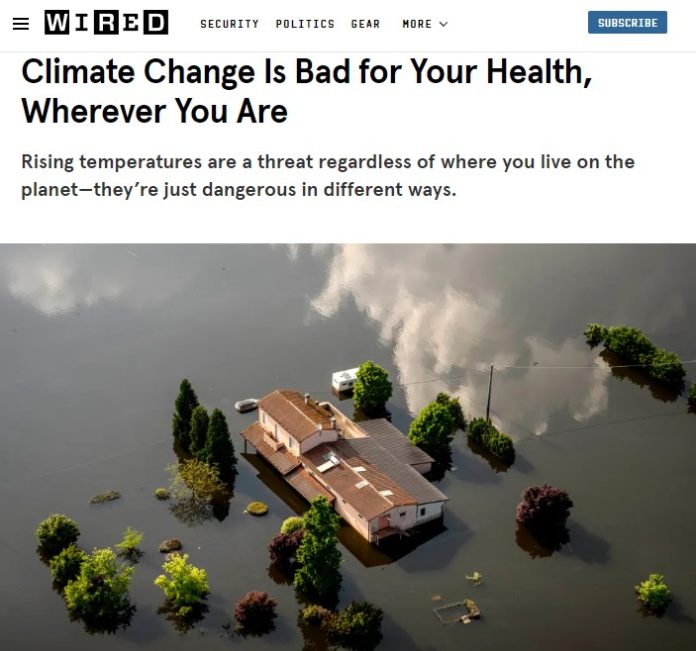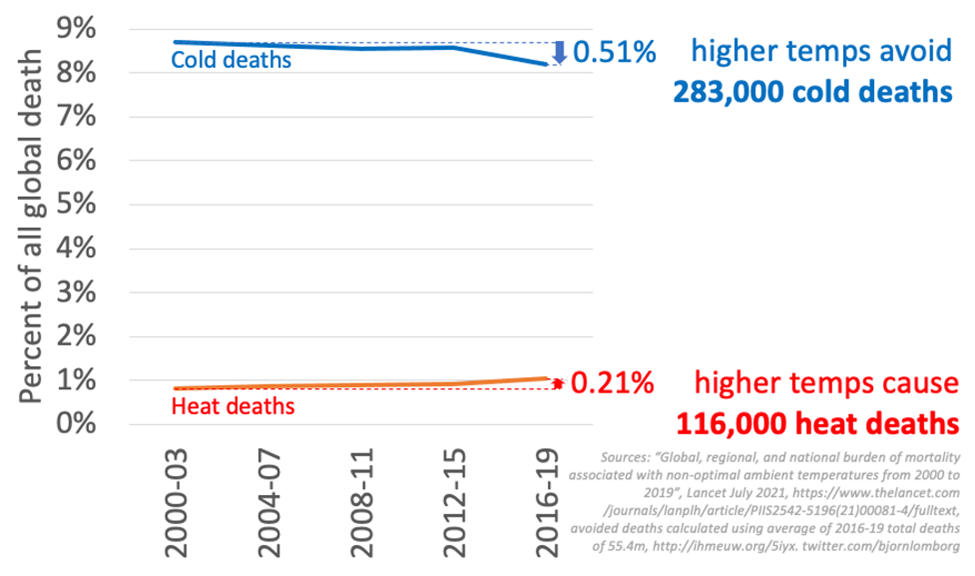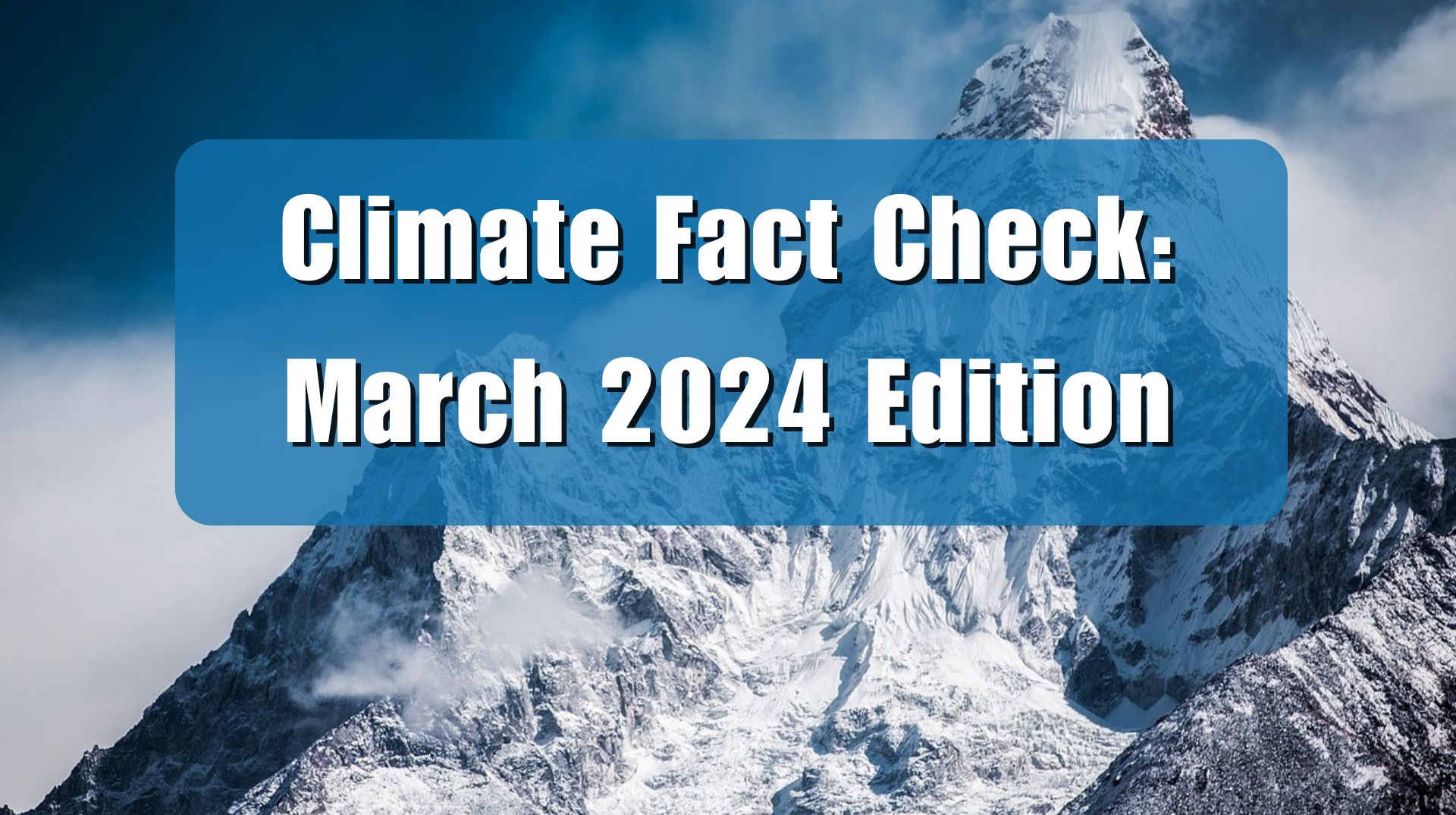WIRED, once ostensibly a tech magazine, recently ran an article titled “Climate Change Is Bad for Your Health, Wherever You Are,” which claims that climate change is threatening human health everywhere around the world by causing more extreme weather, introducing diseases to new areas, and driving economic insecurity and migration. The claims that are testable are false. The other claims, especially those dealing with “indirect” impacts of climate change, are speculative and not backed by data.
The article, written by Rob Reddick, consists of an interview with Marina Romanello, the executive director of the Lancet Countdown, a climate change activist group.
Reddick writes that extreme heat kills “roughly half a million people worldwide each year, but at the current rate of global warming it could be close to five times as deadly by 2050.”
While it is true that a 2021 Lancet study found that high temperatures kill almost 600,000 people worldwide every year, what Reddick left out is that the same study found that cold temperatures kill 4.5 million people worldwide every year. As explained in Climate at a Glance: Temperature Related Deaths, while an increase in average temperatures may result in a few more deaths due to heat, cold deaths decline by a much greater amount, resulting in an net reduction in temperature related mortality. (See figure below)
Multiple other studies, including some published in The Lancet referenced in Climate Realism posts, here, here, and here, for example, confirm that because cold kills as many as ten times more people than heat, deaths tied to temperature have declined dramatically as the Earth has slightly warmed.
Reddick also claims that climate change causes “chaotic weather and higher temperatures” which “generate natural disasters,” however data on the most severe natural disasters, and most importantly, their impacts on human lives, do not show that these events are getting deadlier. In fact, data collected by the International Disaster Database show that deaths tied to extreme weather events and other natural disasters have dropped substantially over time. This is largely due to improvements in warning systems, emergency services, and technology. There is no reason to believe this trend will not continue.
Nor are extreme weather events getting more common, as explained in detail in Climate Realism posts here, here, and here, for a sampling.
Romanello also asserts that climate change is causing indirect impacts that are deadly. She says that extreme weather (which is, in fact, not getting worse) is impacting “food systems, water quality, and the transmission of infectious diseases like dengue and malaria, which are spreading into new parts of the world.”
Regionally or locally, different crops may be impacted by weather events and have poor yields for a season or several seasons. This is nothing new. Overall, crop production across the board has grown substantially during the recent period of modest warming, even in regions like Africa and India, which are frequently cited as being particularly susceptible to the effects of climate change.
Water quality is a water handling and storage issue, not a climate issue.
And finally, Romanello’s comment about dengue and malaria is also incorrect. They are not spreading to “new parts of the world,” climate models predict they might, as research by epidemiologists and experts in insect-borne illnesses shows. As discussed in the Climate Realism post about dengue fever, the disease already existed in the regions it currently inhabits, like Asia, for hundreds of years. It is not spreading to new areas. Regarding malaria, that disease was endemic in over half of the world’s land surface in 1900 and has declined to 30 percent since then. More than a dozen peer-reviewed studies demonstrate that a slight rise in temperature alone is not enough to guarantee migration or longer survival of mosquitoes or mosquito-borne illnesses like malaria, and the data to date shows no spread.
Regarding migration, Romanello claims that climate-related migration is “growing rapidly.” She claims it’s “very difficult to measure, because there’s no good international monitoring, or much internal monitoring—and most movement is actually within country boundaries.” Again, this is nothing new, and since extreme weather is actually not getting more frequent or intense, and crops are regularly setting records, regional relocations of people can’t be blamed on climate change. This claim has nonetheless been made over and over in the media, often pointing to war-torn regions like South Sudan and Somalia, but government corruption, civil strife, and war are responsibly for those peoples’ suffering, not the weather, which has not measurably changed.
Many of the metrics of human suffering discussed by Romanello are based on self-reporting, which is unreliable at best. For the problems for which metrics, hard data, and copious amounts of research exists, it does not support Reddick’s or Romenallo’s assertions that climate change is making them worse. By contrast, in many cases, such as food production and temperature related mortality, the modest warming has made the situation better.
Romanello claims that Lancet Countdown has linked a staggering variety of problems to climate change, from kidney and heart disease to “lost labor capacity,” but based on the available data, it appears that they and WIRED are looking at human health through the myopic lens of climate change, seeking to connect climate change to each and every harm people and societies experience, even with connections are tenuous or even non-existent. WIRED has been publishing on climate change for a while now, but they should probably stick to their technology wheelhouse.

















